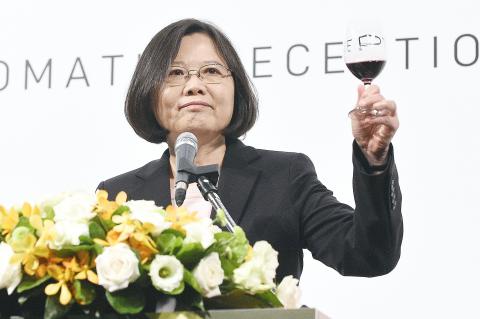Democratic Progressive Party (DPP) presidential candidate Tsai Ing-wen (蔡英文) yesterday announced a “new southward policy” to strengthen relations with Southeast Asian countries and India.
Tsai said ASEAN and India are soon to become major economies in the world and that “it is a natural choice for us to step up overall relations with ASEAN and India” as Taiwan seeks to diversify its trade.
“In the future, we will establish a task force to actively execute the goals of the policy,” Tsai said at a cocktail party for foreign envoys in Taiwan celebrating the 29th anniversary of the founding of the DPP.

Photo: Chen Chih-chu, Taipei Times
The nation’s “go south policy” in the past was designed to encourage Taiwanese enterprises to increase investment in Southeast Asian countries, Tsai said, adding that trade and investment will only be a part of the cooperation under her southward policy.
A diversified and multifaceted partnership is also to be established for civilian exchanges, as well as cultural and educational links, she said.
On the DPP’s foreign policy, Tsai said that “among us [the attendees at the party], there might be some countries whose national interests are not quite the same, and whose views on some issues might be different, but I believe all nations are striving for the same goals of peace, stability and prosperity.”
“We believe that there is a need to establish a domestic legal mechanism” to let Taiwan take part in the international community’s assistance for refugees, she said, adding that the DPP will also make efforts to ease regional conflicts, citing the tension in the South China Sea as an example.
More than 140 diplomatic personnel from 64 countries attended the party, including American Institute in Taiwan Director Kin Moy, Japan’s Interchange Association Representative Mikio Numata and Singapore Trade Office in Taipei Representative Wong Wie Kuen (黃偉權).
In response to Tsai’s policy announcement, Chinese Nationalist Party (KMT) presidential candidate Hung Hsiu-chu (洪秀柱) said that her staff are also drafting a foreign policy platform and that she is “of course” in favor of a policy that “does not put all of our eggs in one basket,” nor will she ignore nascent economic opportunities in ASEAN member states.
However, she added that she opposes any “single-minded” move to the south that “abandons the giant Chinese market to the west.”
Additional reporting by Chen Yu-hsuan

US climber Alex Honnold is to attempt to scale Taipei 101 without a rope and harness in a live Netflix special on Jan. 24, the streaming platform announced on Wednesday. Accounting for the time difference, the two-hour broadcast of Honnold’s climb, called Skyscraper Live, is to air on Jan. 23 in the US, Netflix said in a statement. Honnold, 40, was the first person ever to free solo climb the 900m El Capitan rock formation in Yosemite National Park — a feat that was recorded and later made into the 2018 documentary film Free Solo. Netflix previewed Skyscraper Live in October, after videos

Starting on Jan. 1, YouBike riders must have insurance to use the service, and a six-month trial of NT$5 coupons under certain conditions would be implemented to balance bike shortages, a joint statement from transportation departments across Taipei, New Taipei City and Taoyuan announced yesterday. The rental bike system operator said that coupons would be offered to riders to rent bikes from full stations, for riders who take out an electric-assisted bike from a full station, and for riders who return a bike to an empty station. All riders with YouBike accounts are automatically eligible for the program, and each membership account

NUMBERS IMBALANCE: More than 4 million Taiwanese have visited China this year, while only about half a million Chinese have visited here Beijing has yet to respond to Taiwan’s requests for negotiation over matters related to the recovery of cross-strait tourism, the Tourism Administration said yesterday. Taiwan’s tourism authority issued the statement after Chinese-language daily the China Times reported yesterday that the government’s policy of banning group tours to China does not stop Taiwanese from visiting the country. As of October, more than 4.2 million had traveled to China this year, exceeding last year. Beijing estimated the number of Taiwanese tourists in China could reach 4.5 million this year. By contrast, only 500,000 Chinese tourists are expected in Taiwan, the report said. The report

Temperatures are forecast to drop steadily as a continental cold air mass moves across Taiwan, with some areas also likely to see heavy rainfall, the Central Weather Administration (CWA) said. From today through early tomorrow, a cold air mass would keep temperatures low across central and northern Taiwan, and the eastern half of Taiwan proper, with isolated brief showers forecast along Keelung’s north coast, Taipei and New Taipei City’s mountainous areas and eastern Taiwan, it said. Lows of 11°C to 15°C are forecast in central and northern Taiwan, Yilan County, and the outlying Kinmen and Lienchiang (Matsu) counties, and 14°C to 17°C